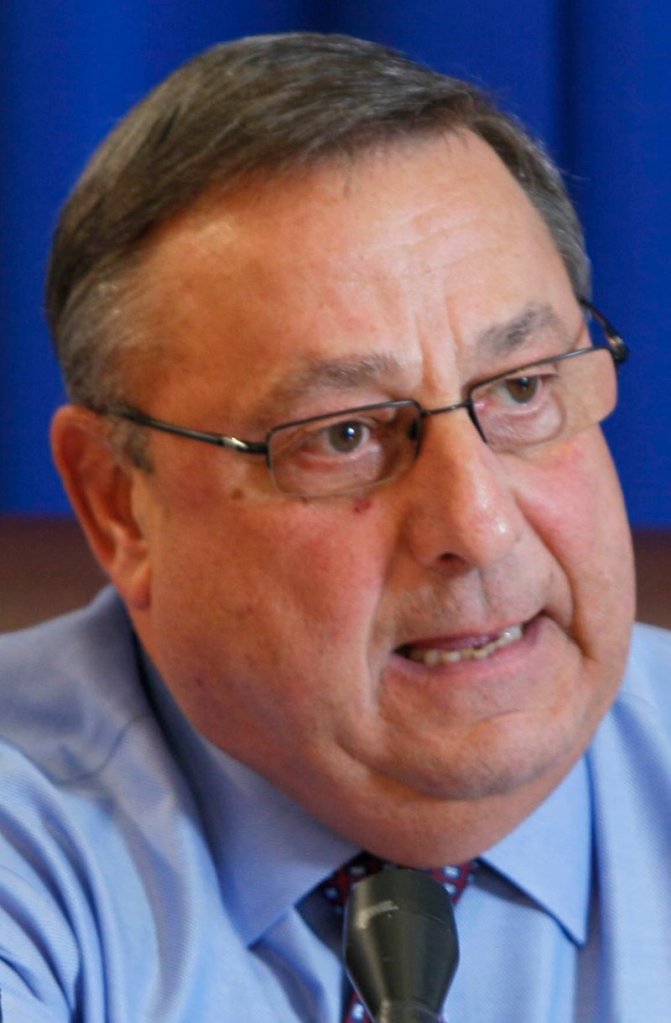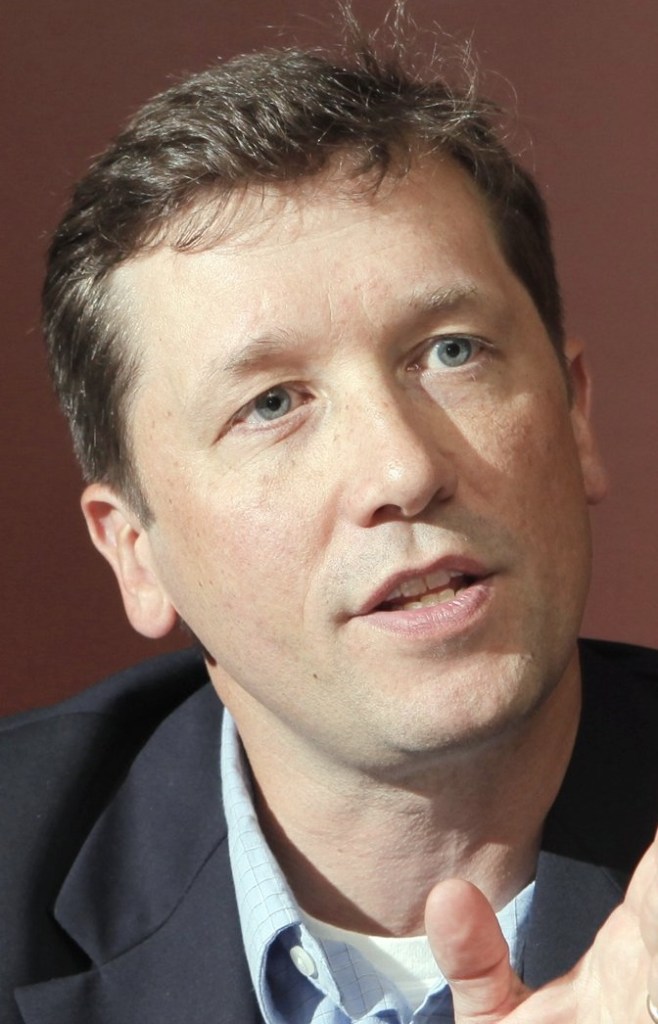SKOWHEGAN — Gov. Paul LePage and Education Commissioner Stephen Bowen announced sweeping education proposals Wednesday that would allow public funding of private and parochial schools, change how teachers and principals are evaluated, allow students greater choice in what schools they attend and expand career and technical education.
The proposals would affect every student, teacher and administrator in Maine. LePage made the announcement in an automotive garage at the Somerset Career & Technical Center, where a Chevrolet pickup truck was raised on a lift.
The proposals are designed to provide “the broadest scope of opportunities” for students, LePage said.
“When I say it’s about the student, I’m talking about making sure each student gets the education he or she wants,” he said.
The four proposals haven’t been published in bill form yet, but they are closely tied to the objectives of the Maine Department of Education’s strategic plan, which was released last month.
The proposals could help steer discussion toward making students’ needs the top priority, said Marylyn Wentworth, an education consultant and a founder and director of The New School in Kennebunk, a private high school.
“Not what’s best for budgets. Not what’s best for teachers. Not what’s best for the teachers’ union or administrators but what is best for kids,” she said.
But the proposals were quickly criticized by the state teachers’ union, the Maine Education Association.
“The governor’s school choice plan is bad for local schools, bad for local communities and bad for Maine’s students and is an attack on the teachers who are tasked with educating them,” said MEA president Chris Galgay.
The proposals would:
• Remove statutory language that prohibits public tuition dollars from going to private religious schools;
• Establish an open -enrollment program that would allow students to attend participating private and public schools beyond their town and district boundaries; and
• Require school districts to develop teacher and principal evaluation systems that use multiple measures of effectiveness, including students’ academic achievement and growth;
• Require school districts sharing a technical center to develop a common school calendar to make it easier for students to participate in training.
INCREASING SCHOOL CHOICE
One proposal would establish a Schools of Choice open enrollment program that would allow students to choose what school they would like to attend, regardless of where they live, as long as the district participates and has available seats.
Schools would decide whether to participate and would determine how many students to accept each year. Students would apply to districts participating in the program, and the schools would receive public tuition funding for students that attend. Private schools already approved for public funding could also accept open enrollment students.
If the number of students applying to attend a certain school exceeds the number of available slots, the school would have to hold a lottery, according to the proposal. Bowen said schools would not be able to cherry-pick the students they want to attend.
Bowen said school districts struggling with declining enrollment would benefit because they could take in more students and therefore receive more state funding.
If students are leaving one school district for another, it “tells you something about your school,” he said, and “you’ve got a bigger problem than open enrollment.”
Galgay said the MEA fears that the loss of transferring students and their tuition dollars would drain resources from the schools they are leaving.
“This proposal pits one school district against the other with serious consequences,” Galgay said. “If schools begin losing students to nearby schools, they will likely face closure.”
Wentworth, from The New School, who is on the board of the Maine Association of Charter Schools, said it’s reasonable for people to fear a drain of students. But charter school openings in other states haven’t caused public schools in those states to become pinched financially, she said.
Under LePage’s proposal, parents would be responsible for transporting their children to a school in another district, although districts could provide transportation if they chose.
RELIGIOUS SCHOOLS FUNDING
Another proposal would remove “statutory language that prohibits public tuition dollars from going to private religious schools,” according to the state Department of Education website.
The schools would have to meet academic standards, including: The school must teach a curriculum aligned with state academic standards, and 100 percent of the school’s teachers must be certified, according to the website.
Bowen compared the proposal with an arrangement that already exists at some private schools, such as Erskine Academy in South China, which educates predominantly public school students and receives public funding.
State law shouldn’t favor private schools while discriminating against parents who want to send their children to a religious school of comparable educational caliber, Bowen said.
Assistant Democratic Leader Sen. Justin Alfond, D-Portland, who serves on the Education and Cultural Affairs Committee, said using local money to pay for private or religious schools “is another example of short-sighted policy that chooses ideology over what’s best for Maine’s people.”
The MEA’s Galgay said using tax money to pay for vouchers to religious schools could run afoul of the separation of church and state.
But Sen. Garrett Mason, R-Lisbon Falls, another member of the education committee, said the U.S. Supreme Court has upheld other states’ authority to cover tuition to private religious schools.
“This is not a radical departure from reality,” he said. “This is a great thing.”
He called LePage’s proposals a “knock out of the park.”
“Every bill on that agenda is looked at through the prism of putting students first,” he said.
NEW EVALUATIONS FOR TEACHERS AND PRINCIPALS
The proposal for teacher and principal evaluations would require Maine school districts to adopt new ways of evaluating education staff based in part on students’ academic performance.
The state education department would begin developing guidelines this year, with the goal of establishing the rules within a year. They likely would be fully implemented in 2015-16.
The evaluation systems would be conducted regularly and would examine students’ academic growth as well as providing specific feedback to teachers and principals to help them improve.
“Ultimately, if a teacher does not improve, yes, there ought to be a way to remove them,” said David Connerty-Marin, a spokesman for the education department.
Rep. Jeff McCabe, D-Skowhegan, questioned whether the state should be determining the accountability systems, particularly when considering the different needs of rural and urban districts.
“That really is something that probably should be driven locally,” he said.
But Bowen said the goal is not to develop a specific statewide evaluation system, but rather a set of broad standards for local districts to apply.
Galgay, of the MEA, said he fears the legislation would eliminate due process rights for long-time teachers deemed ineffective for two consecutive years by putting them back on probation.
Mary Turbyne, a retired teacher from the Skowhegan area, said any such attempts to change the state’s education system must involve the support of teachers or they will fail.
The proposal also would require the State Board of Education to create an alternative teacher certification process for people who have not completed an approved educator preparation program but who are deemed to have the academic expertise to be effective teachers.
In addition, it would have the education department examine degree programs that prepare people to be teachers and keep track of how many students graduate, how many become certified teachers and how many are still teaching after three and five years.
Switching to a new evaluation system is “a very tall order and cannot be achieved overnight,” said Ken Coville, superintendent of Anson-based School Administrative District 74.
TECHNICAL EDUCATION
LePage said the goal behind legislation concerning career and technical education is to make it easier for students to attend vocational centers.
The bill would require school districts that share a technical center to develop a common school calendar with no more than five dissimilar days in order to promote more hands-on participation.
It would allow vocational students to transfer some credits to the Maine Community College System, and it would ensure that academic credits earned from attending classes at technical centers are recognized by their home high schools.
David Ruff, executive director of the nonprofit group Great Schools Partnership based in Portland, applauded the proposed partnership between technical centers and the community college system, saying, “It’s time that we all start working together on solutions.”
Ryan Gove, 18, of Mercer participates in the outdoor resources program at the Somerset Career & Technical Center. Some classes last several hours, he said, and he enjoys exploring topics in depth.
Ivan Beaulieu, 18, of Smithfield, a senior at Skowhegan Area High School, is in the same program. He said any way to get more students involved in career-oriented education is good.
“You learn what you want to do before college and have to pay money … just to learn what you want to do in the first place,” he said.
Morning Sentinel Staff Writer Erin Rhoda can be contacted at 612-2368 or at:
erhoda@centralmaine.com
Send questions/comments to the editors.




Success. Please wait for the page to reload. If the page does not reload within 5 seconds, please refresh the page.
Enter your email and password to access comments.
Hi, to comment on stories you must . This profile is in addition to your subscription and website login.
Already have a commenting profile? .
Invalid username/password.
Please check your email to confirm and complete your registration.
Only subscribers are eligible to post comments. Please subscribe or login first for digital access. Here’s why.
Use the form below to reset your password. When you've submitted your account email, we will send an email with a reset code.